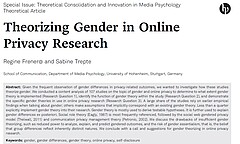Gender Theory in Online Privacy Research: New Study in the Journal of Media Psychology [04.05.22]
Gender is included as a variable in many studies on online privacy – but how is the complex construct theoretically embedded? In a new article in the Journal of Media Psychology, we explore how gender is operationalised and discussed in more than 100 studies on online privacy.Gender is one of the most important social categories and a topic that is heavily discussed in society. The close connection between gender and privacy has existed since the beginning of time and was already the subject of lively debate at the end of the 19th century, when the demand for domestic privacy was criticized by feminists who saw privacy as a tool of patriarchal oppression.
A systematic analysis of 107 studies on online privacy that (partly) examine or mention gender shows that the variable is almost always operationalized in the sense of a male/female distinction; even if an understanding of gender in the sense of socialization processes (instead of a purely biological characteristic) is implied. In most studies, no gender theories are used to develop hypotheses or discuss results, but rather singular findings from other (primary) studies are cited.
The article shows what consequences the sparse theorization of gender can have both for research and in the social context. In addition, recommendations for an adequate consideration of gender for researchers are given. The study was published in the special issue Theoretical Consolidation and Innovation in Media Psychology in the Journal of Media Psychology.
The study is part of Regine Frener's dissertation on gender and privacy. If you do not have access to the Journal of Media Psychology, you can find the manuscript on Research Gate.

